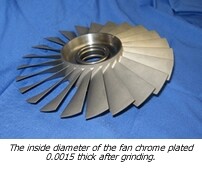




Though originally confined to aerospace and military applications, within the last half century titanium has become prominently used in a variety of industries. Titanium alloys are suitable for many applications, especially ones that require both high strength and low weight. While excellent for use as a structural material, in tribological applications titanium performs poorly due to its high coefficient of friction and chemical reactivity.
Over the years, many surface treatments and coatings have been proposed to alleviate titanium’s inherent problems of seizing, galling, and fretting wear. If a thin layer of chromium could be added to the titanium surface, one could have the best of both worlds – the high strength and low weight of titanium combined with the high wear resistance and low friction of hard chrome. But traditionally, metal finishers have found it very difficult to get good adhesion when plating on titanium – some even say it is unachievable. As a highly reactive metal, titanium will form an oxide surface layer the moment it comes into contact with the oxygen produced by the electroplating process. This oxide layer then prevents the plating from properly bonding to titanium.
U.S. Chrome’s research and development team took on the challenge and engineered a proprietary hard chrome plating process that allows chromium to be deposited directly on to titanium. Now in most cases, it is possible to electroplate a thin protective layer of chromium, to protect from wear and friction, over a titanium part and turn a titanium-tribology problem into a chromium-tribology success story.
Of the many advantages of titanium, it is particularly known for its high strength-to-weight ratio. Titanium parts can be designed with the same strength as steel parts and have lower weight; or they can be designed with the same weight as aluminum parts and have twice the strength. Other advantages include excellent corrosion resistance, high temperature resistance, and low thermal expansion. When these traits are combined with the protective nature of hard chrome, titanium can be successfully used in tribological (wear and friction) applications too.
Titanium’s properties make it ideal for many structural applications. Though historically titanium has had a bad reputation for applications involving rolling, sliding, and wear, U.S. Chrome’s hard chrome plating process now makes it possible for engineers to successfully use titanium in these tribological applications as well. Manufacturers from every industry look to U.S. Chrome to provide hard chrome plating on titanium parts for hydraulic systems, engines, satellites, and more.
We’re confident US Chrome will be your best option for your chrome plating applications because of our engineering approach, exceptional customer service, and regional locations. Contact us now with your questions or coating challenges.
We’ll help you find the right answer.
Subscribe to our newsletter to learn more about the electroplating industry!
US Chrome has been helping engineers find solutions to surface coating challenges for more than 80 years.